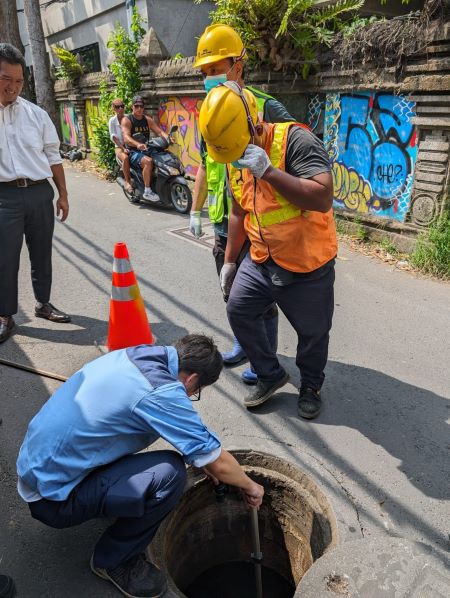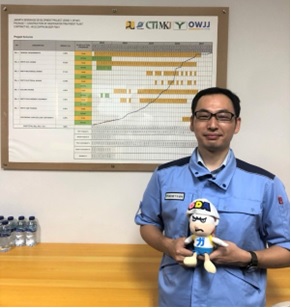After all, it’s human interactions on the field (gemba) that count.
2024.09.18
-

- Hara Shohei Senior Vice President
My daily work in the Operations Strategy Department, JICA Headquarters, is mostly completes in Tokyo. This involves discussions, consultations, and coordination with various stakeholders, including internal departments of JICA, the Ministry of Foreign Affairs, government agencies, and members of the Diet (parliament). As JICA utilizes the national budget, which is funded by taxpayers of Japan, it is crucial to garner interest, understanding, and support from a wide range of stakeholders within the country. This is the field or gemba for me and I find it very rewarding.
Recently, I had the opportunity to go on a business trip to the Philippines and Indonesia after a long time. In the Philippines, I visited the Pasig-Marikina River Channel Improvement Project, which successfully mitigated floods in Manila, as well as the ongoing construction of the Metro Manila Subway Project. Additionally, I was able to visit the site of cooperation in supporting the peace process in the Bangsamoro Muslim Mindanao Region. In Indonesia, I visited the Jakarta Sewerage Project, which is the first full-scale urban sewage system in the megaropolis, and the Patimbang Port Development Project, a gigantic-scale new port development. Having been involved in infrastructure projects in my professional career such as the Delhi Metro Project in India and port projects in Iraq, I still feel a strong sense of excitement when visiting large-scale and dynamic infrastructure construction sites.

Training Indonesian engineers on periodic inspections of sewer pipes
In each "field," I have met many "passionate individuals"
Needless to say, these "passionate individuals in the field" include not only the people of the partner countries who work together towards a better future and nation-building but also the National Staff members of JICA Offices who consolidates trust with these individuals and contribute to their own country's development through JICA.

Mr. Korikawa, a sewerage specialist from the Bureau of Sewerage of the Tokyo Metropolitan Government, is currently posted as the JICA Expert to the Directorate General of Housing of the Ministry of Public Works and National Housing in Indonesia.
Through these visits, I was deeply reminded of a very obvious fact: JICA's development cooperation is based on and supported by those individuals, regardless of the various schemes of JICA's projects, such as technical cooperation, loan or grant based financial cooperation, or private-sector partnership. It is through the human interactions among the “individuals with passion in gemba", social changes are realised. This process often involves intense and sometimes even vigorous discussions and negotiations, but it is at the same time a shared opportunity where individuals with different backgrounds help and learn from each other, and where "trust" is formed through these processes.
After the trip, I had the opportunity to read the book "Nihon-gata Kaihatsu Kyouryoku to Social Innovation: Chishiki Sozo ga Sekai wo Kaeru" (Japanese style development cooperation and social innovation – knowledge co-creation changes the world) (Chikura Shobo), by Prof NONAKA Ikujiro (ISBN: 978-4805113134). In this book, the author explores seven initiatives by JICA that have brought about social transformation and "social innovation" through storytelling. Each initiative is carefully examined from the perspective of Professor Nonaka's "Knowledge Creation Theory," organizing the "field experiences" into "knowledge" and presenting them as valuable resources for international sharing and dissemination.
It may seem like a difficult book when described this way, but it features the "passionate individuals in gemba" of JICA, including staff, experts, and consultants. Some of the people familiar to me tell their stories in their own voices. The book covers various aspects, such as our behaviour as "outsiders" to learn and understand the local needs and gain trust from the people, creating opportunities for co-creation that can be achieved uniquely as "outsiders," engaging with people from different backgrounds of the society, and overcoming the challenges that arise one after another. It incorporates many examples of struggles and successes when things don't go well, which made me exclaim, "This is the very essence of JICA's work!" There are also heartfelt stories, including that of Mr. Ochiai (Advisor to the Chief Minister of the Bangsamoro Transitional Authority) who quietly and steadily engaged in dialogues among the complex stakeholders in the complex circumstances of the Bangsamoro Muslim Mindanao Autonomous Region and gained the unwavering trust of the local people by literally being there for them, and the JICA staff who supported him. This book is a must-read for those interested in development cooperation.
Many of gemba of development cooperation are in distant countries, and we often receive feedback that it is difficult to grasp the impact and significance for Japan. In this connection, I personally believe that JICA's role in development cooperation is to build trust through working with developing countries in transforming their societies for the better, and to contribute to building a foundation for a good relationship between Japan and the partner countries, thereby creating the future of Japan in the world (I have written something similar before). I believe that there is something between the activities and passions in gemba and their significance for Japan that has not been fully captured or explained, but that is something very deep and expansive, like the roots that support large trees in an invisible yet way. I think that one of the ingredients to explain something is the "amount of passion on the ground”.
Indeed, working with developing countries to transform their societies for the better is a challenging task. The differences in language, society, and cultural contexts make it necessary to adopt a bottom-up approach that involves persuasion and stakeholder involvement. This approach focuses on nurturing foundations, creating systems, establishing rules, and institutionalizing change, all while collaborating with a diverse range of people. This process, which is lengthy and demanding, stands in contrast to a top-down or "preaching" approach. It can be considered quintessentially Japanese in its emphasis on collaboration and empathy. To achieve successful transformation, it is crucial for individuals on the ground to possess a deep passion for their work. By connecting with others through “feelings, empathy, and intuition” (Nonaka ibid.), they can create new value alongside the people of the partner country.
This passion not only builds trust with the people of the partner country but also contributes to fostering a strong relationship with Japan. It ultimately leads to a sense of significance for Japan in its efforts to support positive change in developing nations.
As we have observed, it is undeniable that passionate individuals play a crucial role in the field of development cooperation. It is also highly commendable that through their passion, more people around the world are gaining an understanding of Japan and its people.
Reflecting on this business trip, it is essential to recognize and appreciate the value of passion in the field. This includes acknowledging the unique contributions of Japan's development cooperation and the individuals involved. Simultaneously, it is important to effectively convey this passion back to Japan, bridging the gap between the field and the home country.
As JICA staff, it is our responsibility not only to work diligently in the field but also to actively communicate the process and experiences. This realization reinforces the importance of effective communication and highlights the expectations placed upon us.
During my time at JICA Iraq Office from 2013 to 2016, we faced challenges due to the security situation that prevented access to the local areas. In response, we made efforts to coordinate face-to-face meetings between Japanese and Iraqi stakeholders in neighbouring countries. These meetings, very precious given the situation those days, were filled with passionate exchanges. I now recall that we were also driven by our own passions during that time.
Now, in my current gemba, I aim to approach the Japanese stakeholders I meet within Japan with the same level of passion. My goal is to convey the passion that exists in JICA’s gemba to them and to garner their interest, understanding, and support. This renewed determination reflects my commitment to effectively communicate the importance and impact of JICA's work to the people of Japan.
scroll